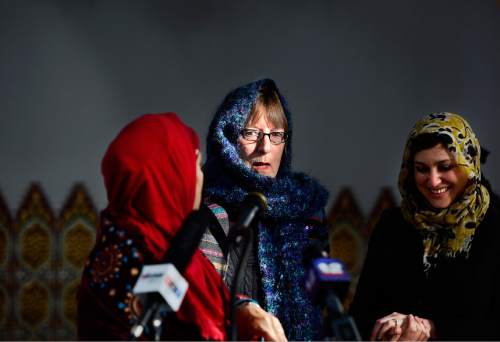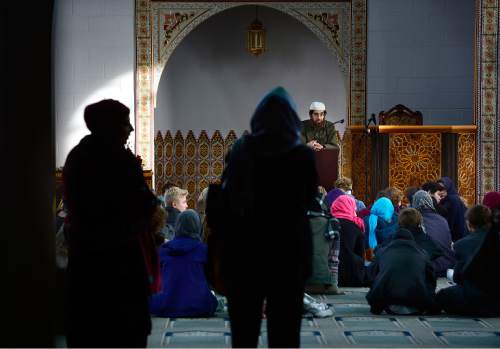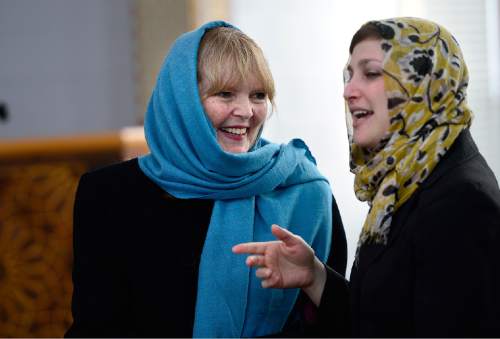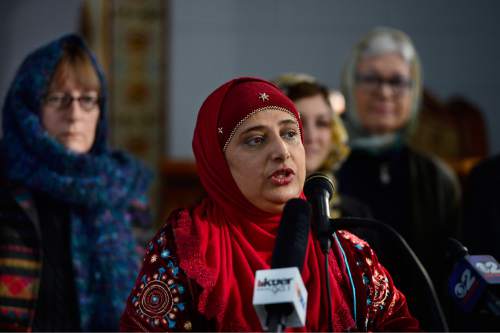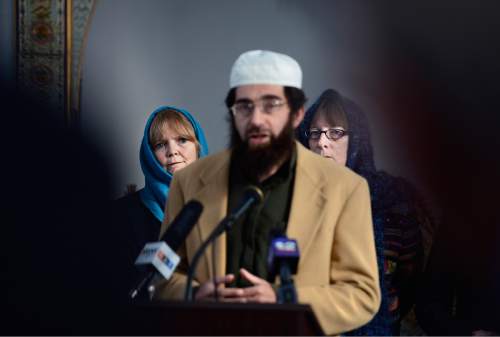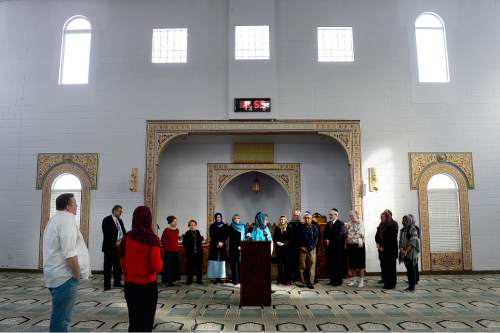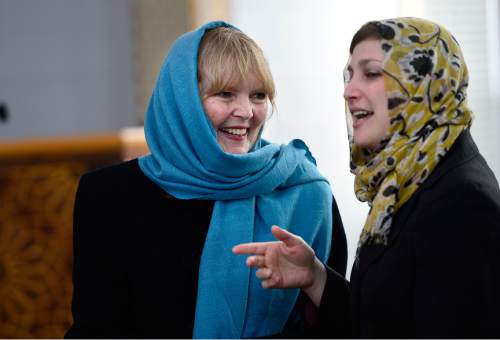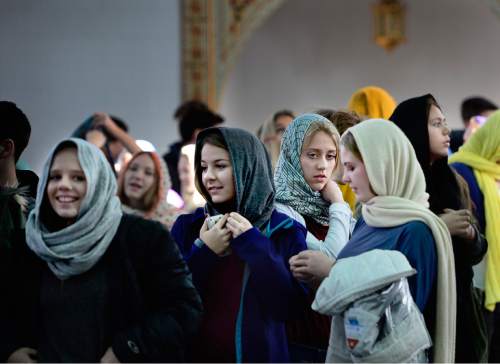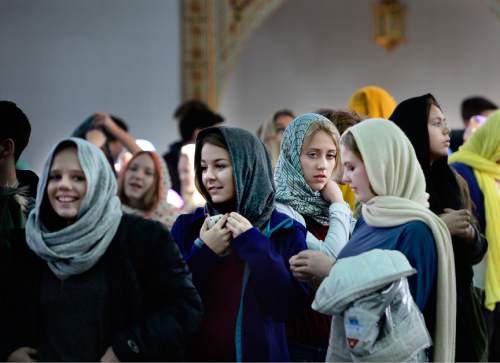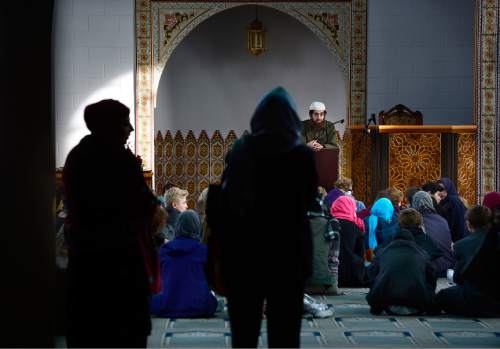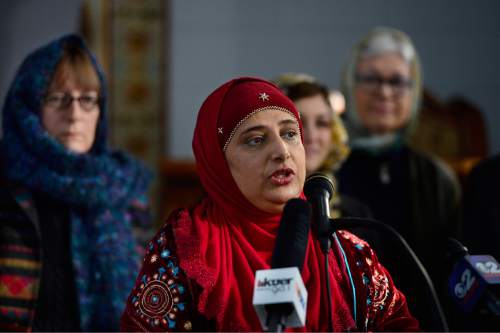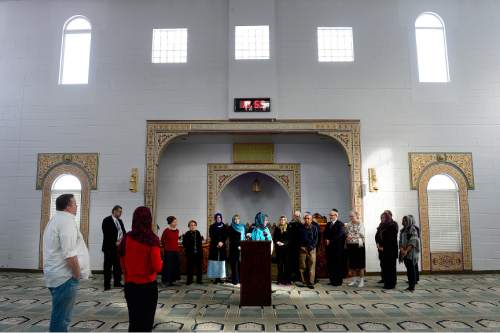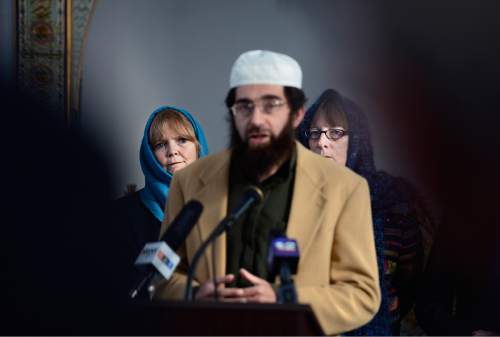Scott Sommerdorf | The Salt Lake Tribune
The Rev. Mary S. Janda ~ Vicar at West Valley Episcopal, center, speaks with Noor Ul-H
Scott Sommerdorf | The Salt Lake Tribune
Imam Muhammed S. Mehtar speaks to a group of students from Corner Canyon High School a
Scott Sommerdorf | The Salt Lake Tribune
The Rev. Patty C. Willis, left, of the Unitarian Church speaks with Rabbi Ilana Schwar
Scott Sommerdorf | The Salt Lake Tribune
Noor Ul-Hasan spoke at a news conference at Khadeeja Islamic Center in West Valley Cit
Scott Sommerdorf | The Salt Lake Tribune
The Reverend Patty C. Willis, background left, of the Unitarian Church listens as Imaa
Scott Sommerdorf | The Salt Lake Tribune
A news conference at Khadeeja Islamic Center in West Valley City, Thursday, December 1
Scott Sommerdorf | The Salt Lake Tribune
The Rev. Patty C. Willis, left, of the Unitarian Church speaks with Rabbi Ilana Schwar
Scott Sommerdorf | The Salt Lake Tribune
Students from Corner Canyon High School leave after a visit with Imam Muhammed S. Meht
Scott Sommerdorf | The Salt Lake Tribune
Students from Corner Canyon High School leave after a visit with Imam Muhammed S Mehta
Scott Sommerdorf | The Salt Lake Tribune
Imam Muhammed S. Mehtar speaks to Corner Canyon High School students about the hijab a
Scott Sommerdorf | The Salt Lake Tribune
The Rev. Mary S. Janda, vicar at St. Stephen's Episcopal Church in West Valley City, c
Scott Sommerdorf | The Salt Lake Tribune
Noor Ul-Hasan spoke at a news conference at Khadeeja Islamic Center in West Valley Cit
Scott Sommerdorf | The Salt Lake Tribune
A news conference at Khadeeja Islamic Center in West Valley City, Thursday, December 1
Scott Sommerdorf | The Salt Lake Tribune
The Rev. Patty C. Willis, background left, of the Unitarian Church listens as Imam Muh
Scott Sommerdorf | The Salt Lake Tribune
The Rev. Mary S. Janda ~ Vicar at West Valley Episcopal, center, speaks with Noor Ul-Hasan, left, and Rabbi Ilana Schwartzman, right, after a press conference at Khadeeje Islamic Center in West Valley City, Thursday, December 17, 2015. Invited guests and other interfaith reps joined together to announce "Wear a Hijab" and other headgear on Friday as a show of support for Muslims.
Scott Sommerdorf | The Salt Lake Tribune
Imam Muhammed S. Mehtar speaks to a group of students from Corner Canyon High School about the hijab and its meaning prior to anews conference at the Khadeeja Islamic Center in West Valley City, Thursday, December 17, 2015.
Noor Ul-Hasan later introduced invited guests and other interfaith reps who joined together to announce "Wear a Hijab" and other headgear on Friday as a show of support for Muslims.
Scott Sommerdorf | The Salt Lake Tribune
The Rev. Patty C. Willis, left, of the Unitarian Church speaks with Rabbi Ilana Schwartzman of Salt Lake City's Jewish Congregation Kol Ami at a news conference at Khadeeja Islamic Center in West Valley City, Thursday, December 17, 2015.
Noor Ul-Hasan and invited politicos and other interfaith reps joined together to announce "Wear a Hijab" and other headgear on Friday as a show of support for Muslims.
Scott Sommerdorf | The Salt Lake Tribune
Noor Ul-Hasan spoke at a news conference at Khadeeja Islamic Center in West Valley City, Thursday, December 17, 2015 to announce "Wear a Hijab" and other headgear on Friday as a show of support for Muslims.
Scott Sommerdorf | The Salt Lake Tribune
The Reverend Patty C. Willis, background left, of the Unitarian Church listens as Imaam Muhammed S Mehtar speaks at a press conference at Khadeeje Islamic Center in West Valley City, Thursday, December 17, 2015. At right is The Rev. Mary S. Janda ~ Vicar at West Valley Episcopal.
Noor Ul-Hasan and invited politicos and other interfaith reps joined together to announce "Wear a Hijab" and other headgear on Friday as a show of support for Muslims.
Scott Sommerdorf | The Salt Lake Tribune
A news conference at Khadeeja Islamic Center in West Valley City, Thursday, December 17, 2015.
Noor Ul-Hasan and invited politicos and other interfaith reps joined together to announce "Wear a Hijab" and other headgear on Friday as a show of support for Muslims.
Scott Sommerdorf | The Salt Lake Tribune
The Rev. Patty C. Willis, left, of the Unitarian Church speaks with Rabbi Ilana Schwartzman of Salt Lake City's Jewish Congregation Kol Ami at a news conference at Khadeeja Islamic Center in West Valley City, Thursday, December 17, 2015.
Noor Ul-Hasan and invited politicos and other interfaith reps joined together to announce "Wear a Hijab" and other headgear on Friday as a show of support for Muslims.
Scott Sommerdorf | The Salt Lake Tribune
Students from Corner Canyon High School leave after a visit with Imam Muhammed S. Mehtar. They listened to him speak about the hijab and its meaning in Islamic culture prior to a news conference at the Khadeeja Islamic Center in West Valley City, Thursday, December 17, 2015.
Noor Ul-Hasan later introduced invited guests and other interfaith reps who joined together to announce "Wear a Hijab" and other headgear on Friday as a show of support for Muslims.
Scott Sommerdorf | The Salt Lake Tribune
Students from Corner Canyon High School leave after a visit with Imam Muhammed S Mehtar. They listened to him speak about the hijab and its meaning in Islamic culture prior to a news conference at the Khadeeja Islamic Center in West Valley City, Thursday, December 17, 2015.
Noor Ul-Hasan later introduced invited guests and other interfaith reps who joined together to announce "Wear a Hijab" and other headgear on Friday as a show of support for Muslims.
Scott Sommerdorf | The Salt Lake Tribune
Imam Muhammed S. Mehtar speaks to Corner Canyon High School students about the hijab and its meaning prior to a news conference at the Khadeeja Islamic Center in West Valley City, Thursday, December 17, 2015.
Noor Ul-Hasan later introduced invited guests and other interfaith reps who joined together to announce "Wear a Hijab" and other headgear on Friday as a show of support for Muslims.
Scott Sommerdorf | The Salt Lake Tribune
The Rev. Mary S. Janda, vicar at St. Stephen's Episcopal Church in West Valley City, center, speaks with Noor Ul-Hasan, left, and Rabbi Ilana Schwartzman, right, after a press conference at Khadeeja Islamic Center in West Valley City, Thursday, December 17, 2015. Invited guests and other interfaith reps joined together to announce "Wear a Hijab" and other headgear on Friday as a show of support for Muslims.
Scott Sommerdorf | The Salt Lake Tribune
Noor Ul-Hasan spoke at a news conference at Khadeeja Islamic Center in West Valley City, Thursday, December 17, 2015 to announce "Wear a Hijab" and other headgear on Friday as a show of support for Muslims.
Scott Sommerdorf | The Salt Lake Tribune
A news conference at Khadeeja Islamic Center in West Valley City, Thursday, December 17, 2015.
Noor Ul-Hasan and invited politicos and other interfaith reps joined together to announce "Wear a Hijab" and other headgear on Friday as a show of support for Muslims.
Scott Sommerdorf | The Salt Lake Tribune
The Rev. Patty C. Willis, background left, of the Unitarian Church listens as Imam Muhammed S Mehtar speaks at a news conference at Khadeeja Islamic Center in West Valley City, Thursday, December 17, 2015. At right is the Rev. Mary S. Janda, vicar at St. Stephen's Episcopal Church in West Valley City.
Noor Ul-Hasan and invited politicos and other interfaith reps joined together to announce "Wear a Hijab" and other headgear on Friday as a show of support for Muslims.


